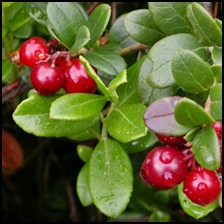You entered Bog Cranberry, the more common name is...

Cranberry
SCIENTIFIC NAME:(Vaccinium oxycoccos)
An evergreen like dwarf bush, the cranberry can be found growing in acidic bogs throughout the northern hemisphere. The red berries have been used as both a food and a medicine for centuries.
Common Names:
American Cranberry, Bog Cranberry

Uses:
Used as a preventative treatment for urinary tract infections, studies have shown that the cranberry prevents bacteria from clinging to the sides of the UT. It is also thought that consuming cranberries may prevent stomach ulcers. Studies are underway for the cranberries benefit in the treatment and/or prevention of Alzheimer’s and stopping the growth of cancer cells, with promising early results. However, more testing is needed before any claim can be made.Applications:
Juice:
3 ounces a day of pure cranberry juice or 11 ounces of cranberry cocktail.
Capsule:
Follow directions on package.
Eating:
Eaten dried, jellied, sauced or frozen, 3 TBLS. 3 times a day
Warnings:
Check with your doctor before using cranberry therapy if you are taking any type of blood thinner including an aspirin a day.
With any herb, there is the risk of an allergic reaction. Small children and pregnant women should use additional caution when considering the use of herbal remedies.





